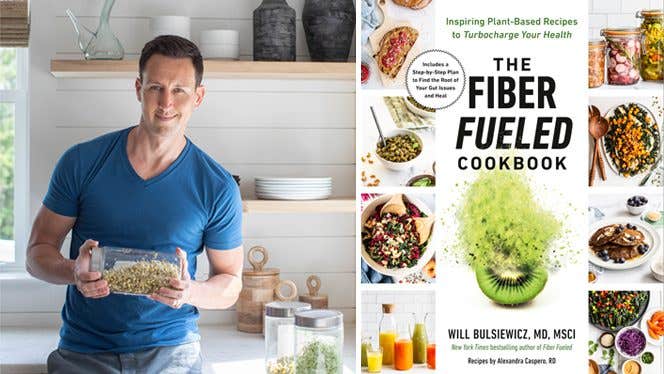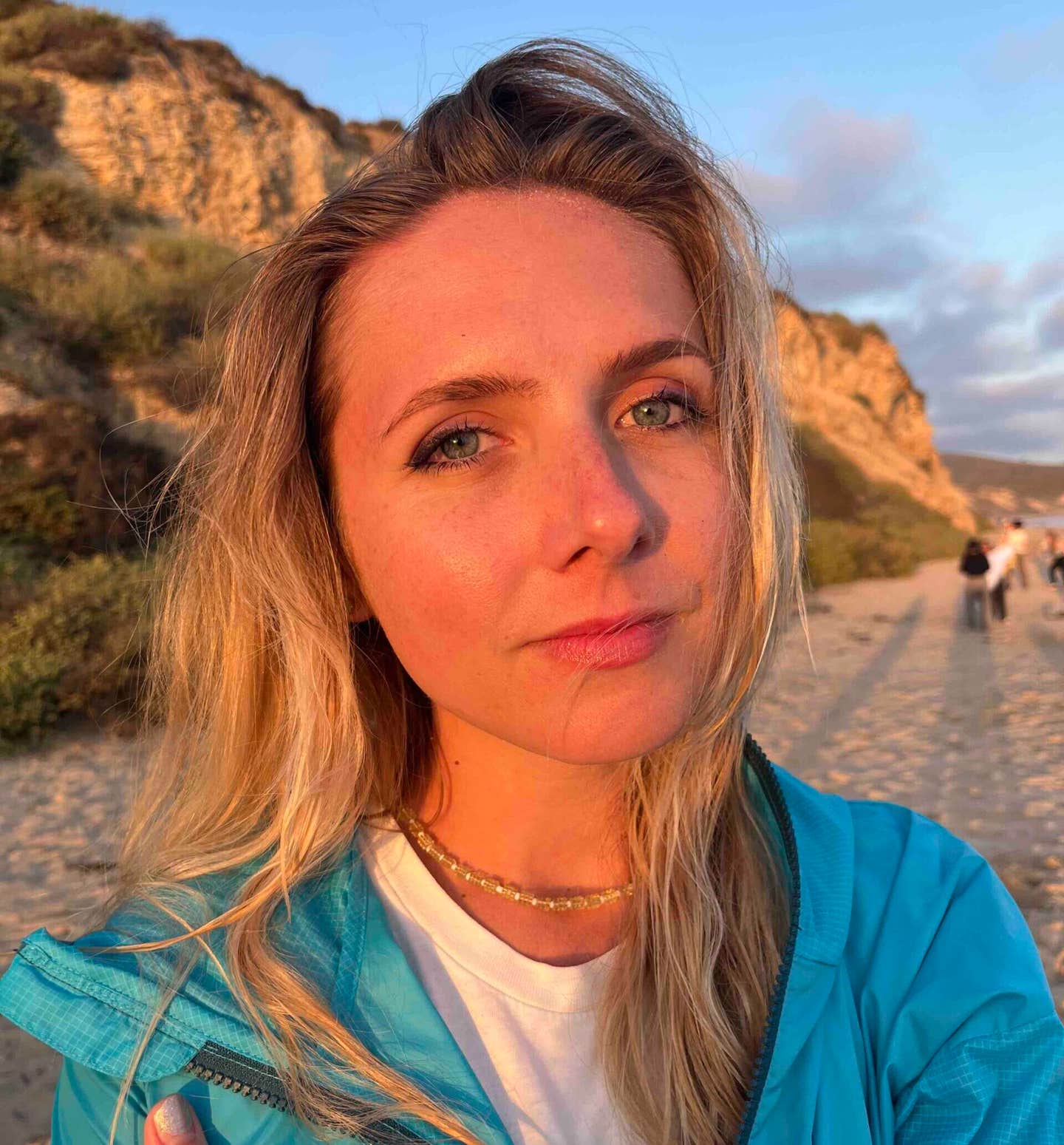
2 Foods to Ditch if You Have GI Issues, Plus More Expert Advice from Gut Whisperer Will Bulsiewicz, MD
Photo by Margaret Wright
As rates of irritable bowel disease and other gastrointestinal disorders have risen in recent years, so, too, has the amount of questionable “gut health” advice floating around on the internet. One prominent voice cutting through the noise is Will Bulsiewicz, MD, MSCI. “Dr. B,” as he’s known to his patients and more than 400,000 Instagram followers, is about as close to a rock star as a gastroenterologist can get. In May 2020, he released his debut book, Fiber Fueled, which explored the fascinating science of the microbiome and broke down why a whole-food, plant-based diet beats fad diets such as Paleo and keto when it comes to sustainable weight loss and long-term health. The book quickly became a New York Times best-seller, highlighting consumers’ hunger for answers to chronic gastrointestinal woes.
Now, two years later, he’s back with The Fiber Fueled Cookbook, a cookbook/guidebook hybrid geared toward helping readers pinpoint their own specific food sensitivities, heal their guts, and develop a repertoire of healthy plant-based recipes they can turn to every day. We spoke with Bulsiewicz about his latest release, the fiber paradox, and the top two foods you should ditch right now if you’re having GI problems. Read on for the full conversation, and check out an exclusive Sweet Potato Shawarma recipe from the new book here.
What made you decide to write this book?
Fiber Fueled was an unexpected success. With that came a lot of enthusiasm from readers, but many came to me saying, “I want to eat the way that you're describing, but I don't feel well when I do.” As a gastroenterologist, I understood what they meant, because I see this in clinic all the time—people who suffer with digestive health problems struggling to increase fiber in their diet. I wanted to create a resource that [empowers] people to eat a diet that heals the microbiome—which is a plant-based diet. … Whether you're healthy or whether you have gut issues and food intolerances, we can share the same common cookbook and pursue a higher level of health together. So that was the goal with this book.
You note that dairy and artificial sweeteners are the first things that you recommend people try ditching when they come to you with gastrointestinal problems. Why?
The reason they cause so much trouble is dairy contains lactose, and 70% of the world is actually lactose intolerant. And artificial sweeteners are what we call polyols: sugar alcohols. Although they may not have calories, they can still be fermented, and they can still be disruptive to our gut microbes. In a person who has bloating or diarrhea, when I remove these things, there’s legitimately a 30% chance that we're done. And that saves my patient a lot of money, they feel better, and now they're given an opportunity to replace this part of their diet with something better. And I see no reason to include [dairy and artificial sweeteners] in your diet at all, from a health perspective.
If a fiber-rich diet is the key to a healthy gut, why do so many people experience uncomfortable bloating after adding more fiber to their diets?
In the book, I call this the fiber paradox. Fiber is the nutrient that heals the gut microbiome. But the people who need fiber the most are also the ones who struggle the most [when incorporating fiber], because their gut is in a damaged state. We lack the enzymes as humans to process fiber, which means that we are 100% reliant on microbes [living in our guts] to do it for us. If you take a person who has a damaged gut microbiome, their capacity to process and digest fiber may be impaired relative to a person who has a completely healthy microbiome. That doesn't mean that they're not capable of consuming fiber. … You can get functionality back and become fully capable of consuming unlimited amounts of fiber. You just have to go through the proper process to do that.
What does it mean to heal your gut?
Your gut is the most adaptable part of your entire body. Like anything else in life, with practice, your gut microbes can become better; they can become more efficient. They can have enhanced functionality. I'm in no position to run a marathon today. If you give me four months to train, I could do it. Similarly, your gut may not be in a position to process and digest large amounts of fiber today, but if you go through this process with me and you train it, in four months, you can do it. So this is a message of hope that we're not stuck. We just need to know how to fix it, and that's what I'm trying to teach in the book.
Could you break down the GROWTH strategy that you outline in the book?
Each letter represents a step in the process of healing your gut. “G” stands for “Genesis”: What is the root cause of your problem? Understanding the problem means that we will be able to create more targeted solutions. “R-O-W” is “restrict, observe, work it back in.” This is the approach that we take to identify food intolerances. A blood test can never tell you what foods you are intolerant to. … If you temporarily remove something and your symptoms improve, and then you add it back in and your symptoms get worse, you have identified a food intolerance. Once we know what we're treating, we can move to the next step, which is the healing phase: “T,” train your gut, “H” stands for holistic healing.
You write that one of the most fulfilling aspects of your career has been helping patients get the help they need to heal emotional wounds, and then watching their “impossible” gut health problems disappear. Why is mental health important to gut health?
It’s very, very important for people to understand that many times it’s the parts that don’t [directly] involve our digestive system that are negatively impacting us. And people may not make these connections. They may think, “Oh, well, the fact that I hate my job has nothing to do with my digestive health problem,” but that's not actually true. You are a whole person, so we have to look at the whole person and understand that anything that’s affecting you as a human being could eventually downstream affect your gut health. And when we create plans to treat you as a whole person—addressing any trauma in your life—we actually are providing the best treatment for your gut health.
Who is The Fiber Fueled Cookbook for?
My book was designed to help people enhance the health of their microbiome in whatever way suits them. So it jumps out as being for people with food intolerances…but if a person has a healthy gut, I want them to understand that our gut health is proving to be essential not just for our digestion but also our metabolism, our immune system, our hormones, our mood, our brain health, and our energy levels. This is a precious resource and so important to our health.…We should all be living with intention and supporting this part of our body, starting today, because it's that important.
This interview has been edited and condensed for clarity.
To learn more about a whole-food, plant-based diet, visit our Plant-Based Primer. For meal-planning support, check out Forks Meal Planner, FOK’s easy weekly meal-planning tool to keep you on a healthy plant-based path.

About the Author

About the Author
Courtney Davison
Join our mailing list
Get free recipes and the latest info on living a happy, healthy plant-based lifestyle.
By providing your email address, you consent to receive newsletter emails from Forks Over Knives. We value your privacy and will keep your email address safe. You may unsubscribe from our emails at any time.